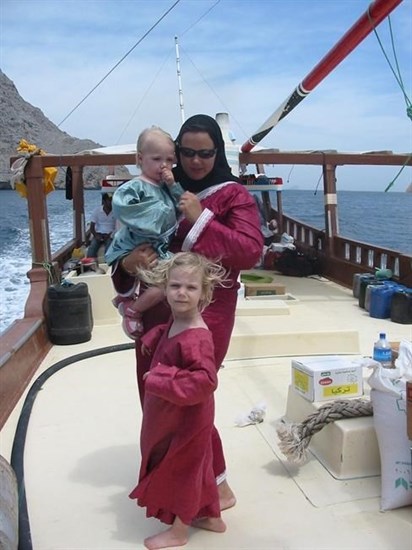
Christina van der Wal and the couple's daughters are seen travelling aboard a boat on their first trip to the Omani village of Kumzar in this March 5, 2006 handout photo. Canadians Erik Anonby and Christina van der Wal have dedicated nearly a decade to documenting Kumzari, an Iranian language spoken by about five thousand people, in a way no one appears to have done before.
Image Credit: THE CANADIAN PRESS/HO-Erik Anonby
September 07, 2015 - 7:00 AM
It's a centuries-old language heard only in a pocket of the Middle East, passed down from generation to generation solely through the spoken word — and a Canadian couple is playing a key role in sustaining it.
Erik Anonby and Christina van der Wal have dedicated nearly a decade to comprehensively documenting the language of Kumzari in a way no one appears to have done before.
Their efforts have seen them spend nearly two years living in the remote village of Kumzar, located on the tip of the Musandam peninsula in northern Oman, immersing themselves and their three young children in the community to study the language now spoken by about 5,000 people.
They've since developed a script for the oral language, compiled a dictionary and written a book on the grammar of Kumzari in an effort to help the language thrive in the future.
"It's our hope that our work will be part of Kumzari living on as a vibrant language," said Anonby.
The couple currently live in Ottawa, half a world away from the village and the people so much of their work is focused on. Anonby is a linguistics professor at Carleton University, while van der Wal is a researcher for Leiden University in the Netherlands.
Their interaction with Kumzari began in 2006, when after hearing about the language, they made a trip to the village to see whether they'd be able to research the language in depth. On that first visit, they met with community leaders, gained the approval needed for their work, and started building the relationships which would allow them to become a part of the community.
The couple then returned in 2007 for a much longer stay of about eight months and then came back again for a similar period of time the following year, bringing their young children with them on both trips.
Initially, they used the Arabic they knew to communicate with some of their bilingual hosts, but gradually the couple became fluent in Kumzari, learning the language word by word, through trial and error.
"We were corrected many, many times. That's how we learned," said van der Wal. "Because language is so patterned, you just gradually fill in more slots with new words, and then you correct it and you make the changes."
Helping them a great deal was just how accepting the villagers were of their presence — van der Wal took part in the daily rituals of the neighbourhood women while Anonby did the same with the men of the community, all efforts that helped them document Kumzari in an organized fashion.
"We were always surprised at how hospitable they were," van der Wal said. "The women would go out every morning and have a communal breakfast ... I was part of that ritual every morning. They just let me be as one of them."
Living in the village with three young children, however, did have its particular set of challenges.
Kumzar — a tight-knit cluster of houses surrounded by steep mountains and the sea — is accessible only by boat, and the scarcity of water in the village meant the family had to deal with water shortages at times. All of the shopping also had to be done elsewhere and then ferried to the village.
The home they lived in, however, had electricity and an air conditioner, a hike up a nearby mountain provided a cellphone connection when needed and their children were young enough that they did not have to go to school.
"It was both difficult because we were so much attending to the children's needs, but also it was a connection with people, because they could see how much we were like them in so many ways, because we had children," van der Wal said of the family's day-to-day life.
Throughout their time in the village, the couple were assisted in their work by members of the community themselves.
"They found it a lot of fun to help me say words correctly, find out exactly what they mean, to help me to learn new words," said Anonby. "There's lot of things that you don't see in a language until you spend time with it."
In addition to listening to, documenting and analysing the language to discern patterns and grammar, the couple also recorded traditional folk tales and then transcribed and translated them, creating a record of what had previously only been spoken stories.
Their work comes at a time when a generation of Kumzari children, who are taught Arabic in school, understand their community's language perfectly, but some aren't comfortable speaking it — a situation which has led to concerns about the language's survival.
"This is a record for historians, for people who want to know the cultural history of the area, for the Kumzari people themselves who are interested now and will be in the future," Anonby said of their work.
"We were privileged to be guests for a certain period of time to look at this language and this culture."
News from © The Canadian Press, 2015